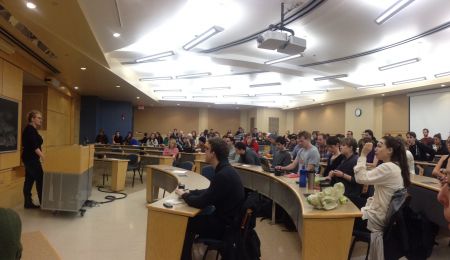K'JIPUKTUK (Halifax)— The Nova Scotia Barristers Society (NSBS) was the first Barristers’ society to both commit and undertake a comprehensive public consultation in deciding whether to recognize a law degree from Trinity Western University’s proposed law school. Other territorial societies across Canada have been watching closely to see how the NSBS would reconcile its strategic framework--which encompasses firm commitments to equity, non-discrimination, and access to justice--with TWU’s discriminatory policies.
Bob Kuhn, president of Trinity Western University (TWU), in a public consultation to the NSBS on March 4, claimed that not recognizing a law degree from his university would be discriminatory to future TWU law graduates.
“TWU’s Community Covenant is not offensive on its face in any respect,” he told NSBS’s Executive Council.
TWU is a private Evangelical Christian University in Langley, British Columbia, that has been gaining attention across Canada since the university submitted a proposal in July 2012 to offer a Juris Doctor program in Law. The university's admissions and hiring policies require students and staff to sign onto a “Community Covenant,” a mandatory agreement to honour the “traditional, biblical Christian values and principles” of the school, prohibiting “sexual intimacy that violates the sacredness of marriage between a man and a woman.”
For failure to adhere to the policy, students face expulsion, and staff face job termination.
In BC, religious organizations are exempt from adhering to the provincial Human Rights Code; however, no such provision exists in Nova Scotia’s Human Rights Act.
"When someone signs onto this covenant, they agree not to engage in the unacceptable behavior. The problem is that the behavior deemed unacceptable is based on sexual orientation," said Megan Leslie, Member of the Canadian Parliament for Halifax, Queer rights activist and founding member of OUTLaw, a sexual rights society at the Schulich School of Law.
"I do not think TWU should be allowed to make students sign that covenant.”
On December 16, 2013, a Special Advisory Committee of the Federation of Law Societies of Canada (FLSC)--the national governing body representing Canadian lawyers--granted preliminary approval of TWU’s proposed law program. However, the legitimacy of the committee’s decision has been questioned because of a lack of transparency, several procedural issues, and deficiencies in the Committee’s membership.
The Dalhousie Student Union (representing the interests of 14,000 students), the Law Students Society (representing 600 Dalhousie law students), the Faculty Council at the Schulich School of Law, as well as the Canadian Council of Law Deans have all taken stances against TWU’s proposed law school.
Canada's 14 provincial and territorial law societies have the choice to recognize a law degree within their province or territory. As a result of the high volume of Nova Scotians raising opposition to TWU, the NSBS has been the first society to undertake a public consultation process to help in its determination of whether TWU graduates will be eligible to practice law in Nova Scotia.
More than 250 individuals and community groups have supported a petition created by OUTLaw calling on the NSBS to oppose TWU's Nova Scotia accreditation.
Many have questioned how TWU’s discriminatory admissions policies can be reconciled with its requirement to teach human rights law and constitutional law, as well as legal ethics and professional responsibility.
LGBTQ+ students are already significantly underrepresented in legal education, and recognizing a degree from TWU would condone the creation of a legal education system that would have more seats available for straight students than for gay and queer students, according to Lee Staples, second year JD Law student and Executive Member of OUTLaw.
Mainstream media and supporters of Trinity Western’s proposed school of law are constructing this as a Christian versus LGBTQ+ rights issue.
“This is an inappropriate and misleading false dichotomy," added Staples. “There are many gay/queer Christians as well as Christian allies that support LGBTQ+ rights and recognize that using an absolute claim to religious freedom to trump the basic human rights of a marginalized group is inappropriate.”
Additionally, the Canadian Bar Association recently passed a motion urging the FLSC and the provincial and territorial law societies to require equal opportunity without discrimination for all persons involved in legal education.
“If TWU, as a legal educational institution, chooses to actively discriminate against a historically marginalized group (as they are doing through maintaining the Covenant) they should appreciate that one of the consequences might be that Canadians stand up for LGBTQ+ rights" commented Staples.
Sheena Jamieson, Support Services Coordinator at The Youth Project in Halifax, a non-profit organization that works with youth around issues of sexual orientation and gender identity, says law practice needs to be accountable to the Canadian social landscape.
On April 24, the Law Society of Upper Canada determined that TWU graduates would not be eligible to practice law in Ontario subsequent to a 28-21 vote. The disapproval of TWU’s degree in Ontario sparked hope for Nova Scotians lobbying against TWU’s institutional discriminatory policies.
The NSBS Executive Summary identified three options available to council in the April 25 meeting regarding accreditation of TWU.
A – Accept the FLSC Approval Committee conclusion and approve the TWU Law School
B – Decline to approve TWU Law School
C –Conditionally approve TWU Law School
After much disheartening discussion, the executive council moved motion C in a 10-9 vote.
The major issue with this is that it turns law students into a "special interest" group by saying that TWU must either a) not force law students to sign the Covenant, or b) not have the Covenant apply to law students, explained Staples.
“Nova Scotia’s choice of conditional acceptance is disappointing. It does not address the discriminatory mechanism that is the Community Covenant. Instead, it treats law students as a special interest group that needs an exemption from the status quo-- while reaffirming the Community Covenant- its value, messaging, and meaning.”



